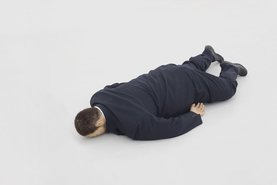weekly column
|
Each week, find a commentary on something connected to verses of Torah or another source of wisdom
|
|
Each week, find a commentary on something connected to verses of Torah or another source of wisdom
|
 The Genesis:3 Project Abram fell on his face and God said to him… Genesis 17:3 Words and phrases that morph into new meanings have fascinated me for a long time. Some words have related origins but different meanings in distinct contexts. “The soup is cool” and “That hat is cool” are two very different sentences. Some words develop different dominant meanings. The 1890’s were known as the Gay Nineties for different reasons than the 1990’s marked a focus on what it means to be gay. And some words can simultaneously mean almost the opposite of themselves depending on their usage. Take the word “strut,” for example. If you use the word to describe a particular way of moving that is deliberate, ostentatious and designed to call attention, then you mean essentially the reverse of what a strut is in a structure – a brace that is meant to stabilize and secure. Over time, the idiom “to fall on your face” has undergone that kind of transition. The image it provokes is pretty consistent; someone who is upright rapidly (with intention) or suddenly (without intention) ends up prone, front to the ground. But it makes a big difference whether the act is one resulting from humility or resulting in humiliation. In contemporary times, it is the latter meaning that is more usual. A face-plant or prat fall is diminishing. The one who lands face-first on the ground is almost always a victim. When it seems somehow deserved, we cheer. When it seems somehow undeserved, we sympathize. When it is meant to be funny, we laugh. I once fell on my face when I stepped just the wrong way on an uneven piece of sidewalk downtown. I broke the frames on my glasses, which resulted in a gash next to my eye. I was in a suit, walking among people in various kinds of clothing. I imagine some of them had each type of reaction. (Only one person stopped to help me.) Other than the aforementioned gash and a sore ankle, I was fine, but the clerks in the store that was my destination reflected back to me in their faces the humiliation I felt. (Hint: don’t enter a jewelry store looking like you have just been mugged.) In the Bible, however, as in all three religions that consider its words sacred, falling on your face is an act of submission before God. It is a voluntary action meant to demonstrate humility and some measure of inferiority. It is no wonder that monarchs have adopted it (sometimes modified as a mere bow) as the preferred indicator of subservience from their subjects. In the Book of Esther, the wicked viceroy Haman served his own narcissism by demanding such a response from all in his presence. Mordecai’s refusal to fall on his face in humility became a fixation for Haman that led to him falling on his face in humiliation (Esther 7:6-8). The difference between the two meanings is the arrogance or lack thereof by the person doing the falling. The person who is so self-involved and self-important that he or she seems to invite being toppled is likely to fall on his or her face. The person willing to humble himself or herself before God by falling on his or her face opens the possibility of being lifted up by grace and beneficence – and maybe even more. After all, in the verse I am discussing, Abram fell on his face and then God spoke to him. I am not 100% proud of the fact that I enjoy some very arrogant and narcissistic people fall on their faces. Caught with their hand in the cookie jar or telling a whopper or making up supposed facts in evidence, I love to see them toppled. Whether they have been a puppet, a pauper, a pirate, a poet, a pawn or a king, when they fall flat on their face, I have some satisfaction. Whether my empathy kicks in or not has to do with the way they pick themselves up and dust themselves off. Sometimes humiliation begets humility. Other times, merely surviving the fall makes someone believe in immunity from meaningful consequences. I try to think of both meanings of falling on my face on Yom Kippur when, deep in the day-long worship, the custom is to bow low to the ground. Not everyone does it (at least in the synagogues I have attended), and the responses of onlookers range from discomfort to amusement. But I am a different person, at least for a moment, when I stand up. I understand my vulnerability in a visceral way, and it gives meaning to the moment that verbal professions of humility cannot approach. Sooner or later, or purpose or by accident, we all fall down. What we glean from it can determine the context of the words the next time we fall on our face.
0 Comments
Leave a Reply. |
Archives
October 2023
Categories |